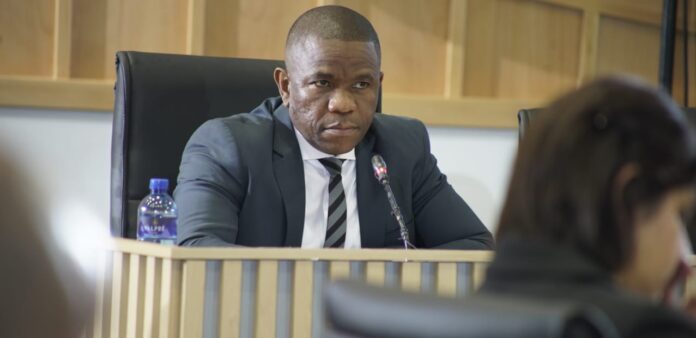The Madlanga Commission of Inquiry opened its proceedings On Wednesday morning in Pretoria, with a significant and telling witness, KwaZulu-Natal (KZN) Police Commissioner Nhlanhla Mkhwanazi. His appearance marks an important moment in uncovering alleged criminality, political interference, and corruption plaguing South Africa’s criminal justice system.
Mkhwanazi’s testimony centres on claims implicating suspended police minister Senzo Mchunu in actions that could undermine justice itself. Specifically the contentious disbandment of the political killings task team.
This unit, according to Mkhwanazi, had made substantial headway in investigating politically motivated murders in KwaZulu-Natal and then extended its reach to the Eastern Cape, including Fort Hare University.
Mchunu influenced by external forces
The KZN police commissioner insists that Mchunu’s decision to dissolve the task team was unlawful. It fell outside the minister’s legislative authority. More strikingly, Mkhwanazi suggests external forces with influence over Mchunu may have been behind this move.
This would be an intentional attempt to stagnate investigations which threatened the interests of powerful figures. Although Mkhwanazi stops short of naming these influences, he promises to bring forward concrete evidence implicating those behind the scenes.
The disbandment has had a chilling effect on efforts to tackle political killings, an issue that has long haunted South Africa’s democracy. His main concern with the disestablishment of the task team is that it will have an impact on his job. And it will further decrease public confidence in the already dubious criminal justice system.
Unit’s dissolution questioned
Mkhwanazi highlighted that some of the task team members who transitioned to Gauteng’s organised crime counter-intelligence operations, contributed to arrests of high-profile suspects like Katiso Molefe and Vusimusi “Cat” Matlala. This link underscores the effectiveness of the unit. It also raises questions about why its dissolution was prioritised over continued investigations.
Mkhwanazi laments the minister’s silence following the disbandment. Attempts to engage Mchunu directly via meetings and even WhatsApp messages went unanswered. The commissioner’s frustrations were fuelled in first discovering the disbandment through a non-government actor rather than official communication.
After his pleas were not addressed, Mkhwanazi took his grievances to parliament’s portfolio committee on Police. And eventually to the media.
As the commission proceeds, there is potential for Mkhwanazi to request parts of his testimony to be heard in camera (behind closed doors). This reflects the sensitive and potentially explosive nature of the evidence he intends to present.
Systemic vulnerabilities
This unfolding inquiry exposes more than just individual misconduct. It highlights systemic vulnerabilities, where political interference threatens the integrity of law enforcement and justice delivery. The fact that a police commissioner feels the need to publicly challenge a minister, signals alarm-bells about the health of governance and the rule of law.
As the Madlanga Commission continues, the nation watches closely. The stakes are high. Not only for those directly implicated but for South Africa’s budding democracy. If the commission’s findings confirm Mkhwanazi’s suspicions, it will underscore the urgent need for reform and vigilance against political encroachment in South Africa’s fight against crime.
In the words of commission chair, Acting Deputy Chief Justice Mbuyiseli Madlanga, if allegations made by Mkhwanazi are true, it “spells doom for South Africa’s criminal justice system”.



